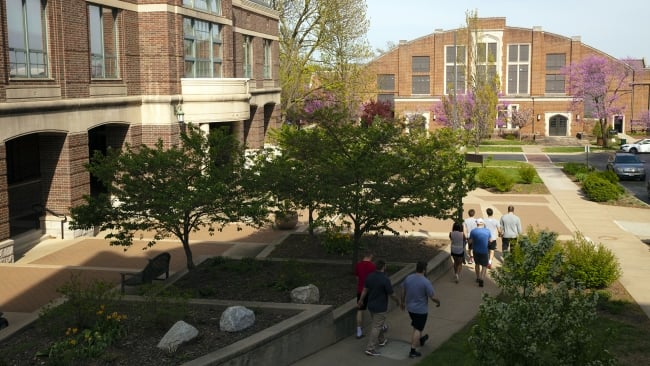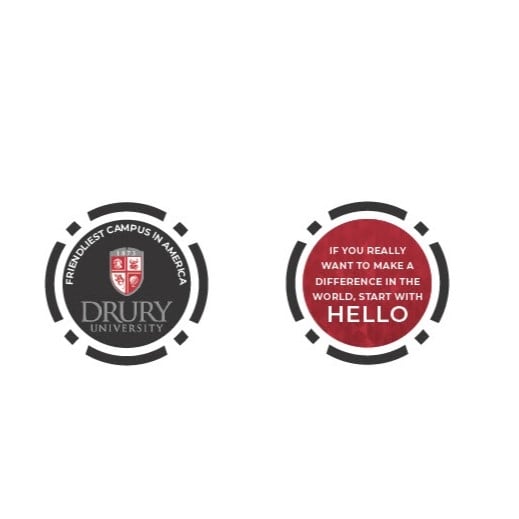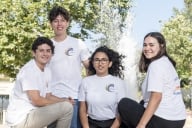You have /5 articles left.
Sign up for a free account or log in.

The Great Game of Hello invites campus community members to greet one another around campus to win $7,000 in prizes.
Drury University
On a college campus in 2024, it’s common to see students walking with their heads down, phones in hands, passing one another by without another thought.
Today’s students say they’re experiencing high levels of social anxiety—a 13-year high, according to data from the Center for Collegiate Mental Health—due in part to isolation from the COVID-19 pandemic, with the average student holding concerns that others do not like them.
The president of Drury University wants to break students out of their shells and promote a campus culture that invites collaboration and engagement, so the university launched a new annual event, the Great Game of Hello.
The rules are simple: greet one another on campus and win prizes. But the intended results are more profound: inspiring confidence and professional skills in Drury graduates.
The background: The inspiration for the Great Game of Hello came from Jack Stack, who serves as interim dean of the Breech School of Business. Stack noticed students spent their time on campus staring at their phones or wearing noise-canceling headphones, not talking or engaging with one another.
“There’s opportunities that walk by them each and every day,” Drury President John Beuerlein says. “To connect for internships, for employment, for connections to trustees, for connections to professors, opportunities for practical education off campus or in the community that students are engaged in,” but students miss those chances when they’re checked out.
At Drury, administrators believe in the power of a liberal arts education and the human skills students develop in addition to their academics to set them apart. Beuerlein sees a college experience like a dessert, where the cake is the core education students receive but the icing is knowing how to pair soft skills with academic knowledge.
“The long-term goal is to give our students a competitive advantage,” Beuerlein says.
The Science of Hello
The 2023 Gallup National Health and Well-Being Index found adults in the U.S. who regularly say hello to multiple people in their neighborhood have higher wellbeing than those who greet fewer or no neighbors.
People who regularly greet six neighbors have higher career, community, social, financial and physical wellbeing compared to those who greet five or less. However, young adults are the least likely group to greet six to 10 neighbors (10 percent), with 31 percent of respondents greeting zero neighbors.
How it works: Administration selected 10 anonymous greeters—faculty, staff and students— to document how many students do or don’t greet them throughout the day.
Participants must say hello (or some other salutation, hey or hi is also fine) to one of these anonymous greeters and they must initiate the interactions. The surveyors don’t speak first, Beuerlein explains, requiring the student to kickstart the interaction.
To opt-in, students, faculty and staff visit the Findlay Student Center to receive their Great Game of Hello Coin, a special poker chip with their raffle number on it.

The Drury logo is featured on the front of the Great Game of Hello coins, along with the phrase “Friendliest Campus in America,” one of the goals of the game.
Drury University
Every Friday in April, students are entered to win a different giveaway prize (all funded by an anonymous donor), which include tickets to Springfield Cardinals and St. Louis Cardinals games, a $200 Drury bookstore gift card, a $500 Visa gift card shopping spree, a $250 Lululemon gift card and more.
How it’s going: The university is tracking the share of the campus community that participates, with the goal of having 60 percent greet the greeters. If 30 percent of the student body says hello to greeters, the university will award a grand prize drawing at the end of the month for four tickets to a Kansas City Chiefs game and a hotel stay.
In the first week, 6 percent of campus was participating, and that number jumped to 18.6 percent in week 2, or around 400 community members, Beuerlein says.
Walking around campus feels different now, students may still be walking around with phone in hand, but they are less likely to be glued to their screens.
Beuerlein also sees fewer students wearing headphones, particularly the “speaker earmuffs, the noise cancelling headsets,” he says. “It’s almost like, ‘Oh you don’t get it, you’re not a part of it.’ If you’re wearing them, you must not be embracing what’s going on around here.”
Student and faculty buy-in came quickly, much to the pleasure of the administration. Coins are handed out sequentially, so students like to flex that they have single- or double-digit coins, proving they’re early adopters of the initiative.
Recently, Beuerlein was waiting for the crosswalk at an intersection with a dozen or so students and one noticed him and said, “Hello, Mr. President,” starting a chorus of hellos that Beuerlein may not have had otherwise. It doesn’t hurt that students assume he’s one of the 10 anonymous greeters who can get them Chiefs tickets, but it’s working. “They always go out of their way to say hi to me,” he says.
Upper-level students noticed the change as well, with the greatest share of their college experience impacted by the pandemic, “it’s like night and day in terms of their experience.”
What’s next: The game will conclude on April 26, when the grand prize will be given to a lucky participant.
The project was overall a light lift for the university, thanks to the $7,000 in donated prizes, so Beuerlein anticipates the event to become an annual offering, encouraging students to stop and say hello.
If your student success program has a unique feature or twist, we’d like to know about it. Click here to submit.








